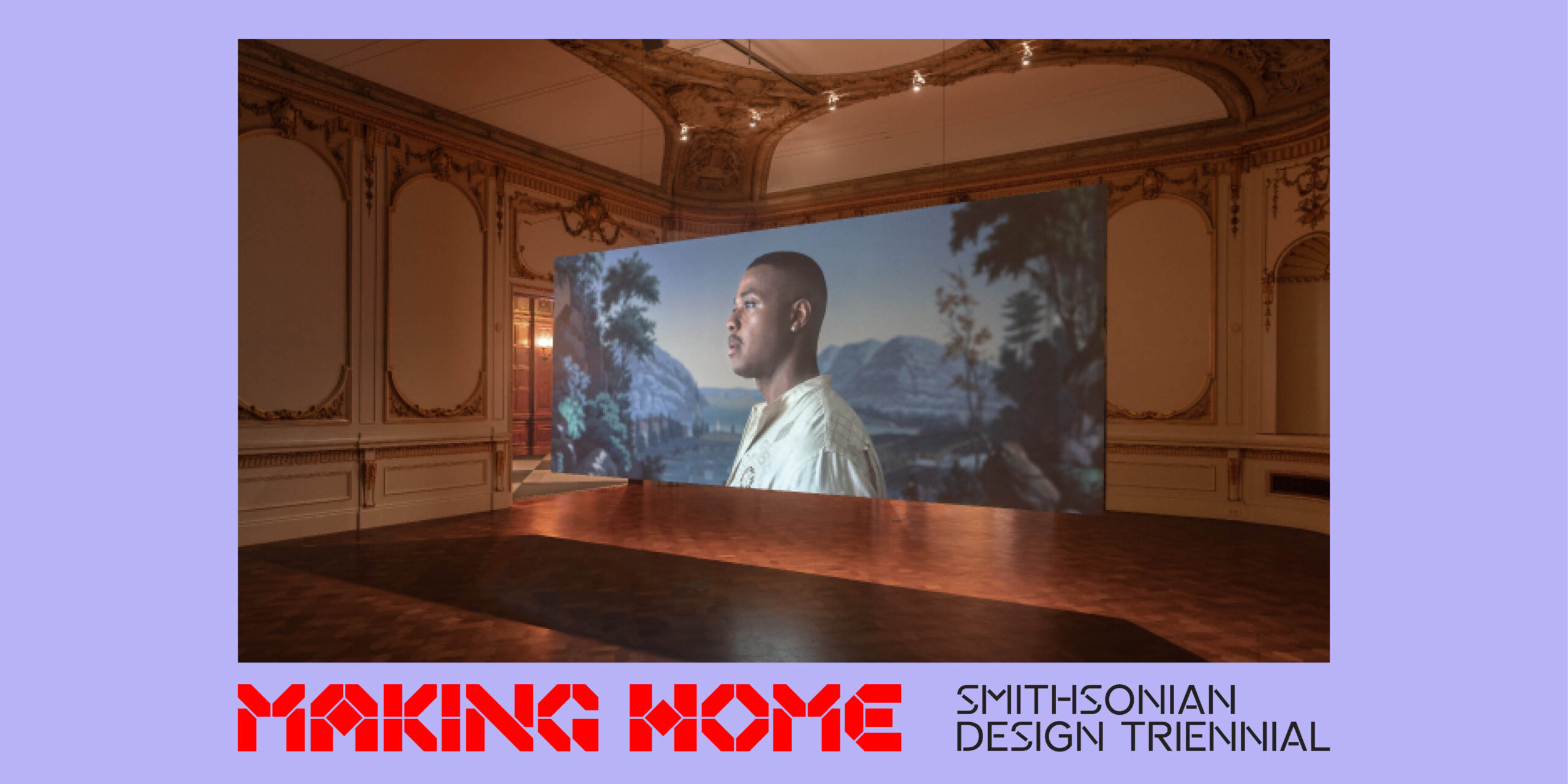A CONVERSATION WITH ARTIST AMIE SIEGEL AND PROFESSOR JASMINE NICHOLE COBB
Working across film, photography, and sculpture, Amie Siegel investigates value, cultural ownership, and image-making. In Vues/Views, her new double-sided work on view in Making Home—Smithsonian Design Triennial, 19th-century French panoramic wallpapers become a prism through which threads of power, privilege, race, and class are performed, both within the papers themselves and in the places they appear today.
For this conversation, Siegel speaks with Professor Jasmine Nichole Cobb, a leading scholar of African American cultural production and visual representation whose published writings trace the emergence of Black freedom as both an idea and as an image in popular culture. Together, Siegel and Cobb will consider the visual and social signification of panoramic wallpapers. The program will explore each of their approaches to questioning depictions of people, landscapes and cultures in material culture across time.
SPEAKERS
 Jasmine Nichole Cobb is a visual and cultural historian. She is Professor of African & African American Studies and of Art, Art History and Visual Studies at Duke University. Cobb is the author three books including Picture Freedom: Remaking Black Visuality in the Early Nineteenth Century (NYUP 2015), African American Literature in Transition, 1800-1830 (Cambridge UP 2021) which is an edited volume; and most recently, New Growth: The Art and Texture of Black Hair (Duke UP 2022). In addition to scholarly essays for Public Culture and American Literary History, her media appearances include, ABC news, the Tavis Smiley Show, Essence magazine, the Boston Globe’s Emancipator and “Left of Black.” Currently, Cobb is at work on The Pictorial Life of Harriet Tubman, a visual history of the abolitionist, from the middle nineteenth century through the present. She earned a PhD at the University of Pennsylvania and presently resides in North Carolina.
Jasmine Nichole Cobb is a visual and cultural historian. She is Professor of African & African American Studies and of Art, Art History and Visual Studies at Duke University. Cobb is the author three books including Picture Freedom: Remaking Black Visuality in the Early Nineteenth Century (NYUP 2015), African American Literature in Transition, 1800-1830 (Cambridge UP 2021) which is an edited volume; and most recently, New Growth: The Art and Texture of Black Hair (Duke UP 2022). In addition to scholarly essays for Public Culture and American Literary History, her media appearances include, ABC news, the Tavis Smiley Show, Essence magazine, the Boston Globe’s Emancipator and “Left of Black.” Currently, Cobb is at work on The Pictorial Life of Harriet Tubman, a visual history of the abolitionist, from the middle nineteenth century through the present. She earned a PhD at the University of Pennsylvania and presently resides in North Carolina.
 Amie Siegel is a visual artist working with film, video, photography, sound, performance and installation. She is known for her layered, meticulously constructed works that trace and perform the undercurrents of systems of value, cultural ownership and image-making.
Amie Siegel is a visual artist working with film, video, photography, sound, performance and installation. She is known for her layered, meticulously constructed works that trace and perform the undercurrents of systems of value, cultural ownership and image-making.
Recent solo exhibitions include Carnegie Museum of Art, Pittsburgh; Scottish National Museum Gallery of Modern Art; Tate St. Ives; Guggenheim Bilbao; South London Gallery; Museum Villa Stuck, Munich; and Kunstmuseum Stuttgart, among other institutions. She has participated in the 34th São Paulo Bienal; 12th Gwangju Biennial; Dhaka Art Summit, Bangladesh; and the Whitney Biennial, among numerous other group exhibitions. Siegel’s work is in the permanent collections of The Museum of Modern Art, New York; Tate, London; Carnegie Museum of Art, Pittsburgh; Art Institute of Chicago; Kunstmuseum Stuttgart; The Metropolitan Museum of Art, New York; Whitney Museum, New York and the Solomon R. Guggenheim Museum, New York.
AccessibiliTy & What to Expect
- Format: The program will begin with a brief welcome, then the speakers will engage in a presentation and moderated conversation. It will end with an optional Q&A with the audience.
- About the space: This program will take place in Cooper Hewitt’s Great Hall on the first floor of the museum. It is fully wheelchair accessible. Theater-style seating is available. There is an accessible restroom on the same floor. Read more about accessibility at Cooper Hewitt.
- Accommodations: The program will have live CART captioning. If we can provide additional services to support your participation, email us at CHEducation@si.edu or let us know when you register. Please make your request as far in advance as possible—preferably at least ten days before the program date.
- Recording: The program will be recorded and posted on Cooper Hewitt’s YouTube channel within two weeks.
Support
Making Home—Smithsonian Design Triennial is presented in collaboration with Smithsonian’s National Museum of African American History and Culture. This project received federal support from the Smithsonian American Women’s History Initiative Pool, administered by the Smithsonian American Women’s History Museum; the Latino Initiatives Pool, administered by the National Museum of the American Latino; the Asian Pacific American Initiatives Pool, administered by the Smithsonian Asian Pacific American Center; and the Smithsonian’s National Museum of African American History and Culture.
Generous support is provided by the Henry Luce Foundation and the Terra Foundation for American Art.
Support is also provided by the Lily Auchincloss Foundation; Edward and Helen Hintz; re:arc institute; the Keith Haring Foundation; the Lemberg Foundation; Maharam; and the Graham Foundation for Advanced Studies in the Fine Arts.

